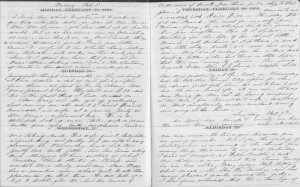
A frequent refrain here at Vita Brevis is that genealogists should consider not just their direct ancestral lines, with a glance at collaterals like siblings or close cousins, but the larger community in which a forebear or collateral relative lived. I was struck by this dictum as I reviewed the Regina Shober Gray diary this winter, as Mrs. Gray lived in a time and place which Jane Austen would have recognized: even the diarist’s closest friends were generally referred to by their married names.
Two of her best friends, not immediately identifiable as Mrs. Gray’s relatives, were unusual in having achieved the degree of intimacy that allowed the diarist to refer to them by their first names, or, daringly, their initials. The first, who was perhaps Mrs. Gray’s best friend at the time the diary began, was Rebecca Parker Wainwright (1820–1901), or R.P.W.; the other was Emeline Matilda Adams (1823–1883; Emily or E.M.A.), who married Caleb Agry Curtis in 1864. What degree of friendship allowed Mrs. Gray to take this liberty, even in her private diary?
Well, as I read through the full run of the diary, to the end of 1884, I realized that both Rebecca and Emily properly belong in the broad social circles that to Mrs. Gray constituted “family.” (And, to be fair, both were friends from childhood, when social forms were more elastic.) In the case of Rebecca Wainwright, Mrs. Gray’s stepmother Lucy Hall Bradlee (1806–1902) was the sister of Frederic Hall Bradlee, who had married Rebecca’s aunt Lucretia Wainwright in 1831. So while Mrs. Gray invariably called her stepmother Mrs. Shober, Mrs. Shober’s sister-in-law’s niece could be addressed as Rebecca.
As for Emily Adams, her connection is even more interesting. Mrs. Gray’s younger sister Susanna Budd Shober is one of the most maddening figures in the diary: a chronic invalid, Sue (or Susan) Shober was also so attractive and charming that she attracted many beaux, among them Charles Frederick Adams Jr. (1824–1856). This courtship took place before the diary commences, but the effects were still felt in the early 1860s, when Emily’s surviving brother Horace died of diphtheria: “Had letters from home this morning, about Sue; had proposed visit to Emily Adams. I am glad she has accepted the invitation, though I have never dared myself to invite Sue to revisit the scenes of her long long agony. But it may do her good to come, if only that it will rouse her and lift her out of her own troubles by the ministry of consolation and sympathy to the now doubly bereaved family of him, once so dear, now so sacred to her. May the effort she makes bring its full measure of comfort to all.”[1]
In this instance, Emily Adams was the sister of Mrs. Gray’s sister’s former fiancé and, therefore, someone Mrs. Gray could address by her first name!
Notes
[1] Hedwiga Regina Shober Gray diary, R. Stanton Avery Special Collections. Entry for 20 March 1861.
Would you untangle the Wainwright relations mentioned in your third paragraph? It sounds as if Frederick Wainwright married Lucretia Wainwright and one of them (not both surely) was Rebecca Wainwright’s aunt. How? Would you clarify this?
Mrs. Shober’s brother was Frederic Hall Bradlee; he married Lucretia Wainwright, Rebecca Wainwright’s aunt.
I still get a jolt when I read the letters between spouses. Dear Mr. Wright …[Insert, we miss you; you have been gone so long; when are you coming home because the farm is going downhill] … Best regards, Mrs. Wright.
How formal the ways of man and wife! I agree! Although I have extended, very extended – (yet still not extended enough) family members who, although youngish and with a new baby – she signs an Easter card to the father of said new baby, “Warmly, Mary”. Warmly? Really? Admittedly, they were both warmer than that when requesting money from us. A few degrees, heaven help us.
I digress.
The mention of smallpox (20,000) hit me in the gut. As did diptheria. As I walk through our local cemetary – beginning mid to late 1700’s, Massachusetts, I see the evidence of childhood illness, turned fatal. Walking through the historic district in the early evenings during our latest winter (and the houses are sublime!) I would look up at the windows, all period curtains, wallpaper – lovely – very heavy snowfall, while beautiful, I looked and quietly said aloud, “Diptheria.” Pain, loss, the depths of grief, those things don’t change. And would surely hold true for the next house. And further. No wonder they packed the church.
It’s wonderful to find this diary…
I just found your most useful site while surfing some today. I really like what I see as my grammar is so terrible at times your suggestions will be greatful.